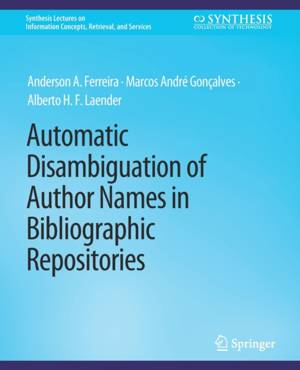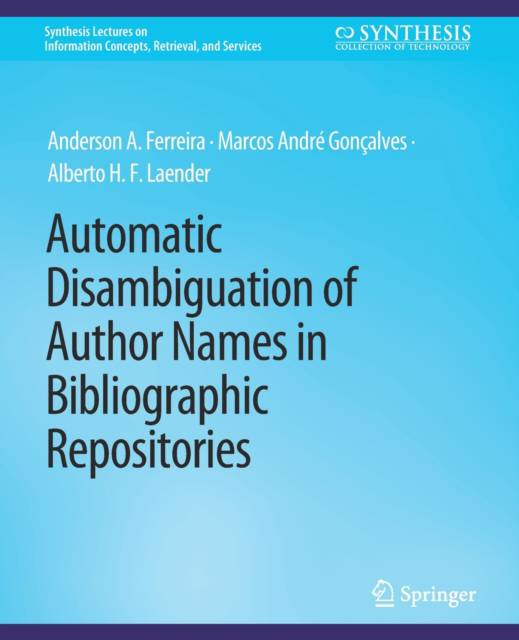
- Afhalen na 1 uur in een winkel met voorraad
- Gratis thuislevering in België vanaf € 30
- Ruim aanbod met 7 miljoen producten
- Afhalen na 1 uur in een winkel met voorraad
- Gratis thuislevering in België vanaf € 30
- Ruim aanbod met 7 miljoen producten
Zoeken
Automatic Disambiguation of Author Names in Bibliographic Repositories
Anderson A Ferreira, Marcos André Gonçalves, Alberto H F Laender
€ 91,95
+ 183 punten
Omschrijving
This book deals with a hard problem that is inherent to human language: ambiguity. In particular, we focus on author name ambiguity, a type of ambiguity that exists in digital bibliographic repositories, which occurs when an author publishes works under distinct names or distinct authors publish works under similar names. This problem may be caused by a number of reasons, including the lack of standards and common practices, and the decentralized generation of bibliographic content. As a consequence, the quality of the main services of digital bibliographic repositories such as search, browsing, and recommendation may be severely affected by author name ambiguity. The focal point of the book is on automatic methods, since manual solutions do not scale to the size of the current repositories or the speed in which they are updated. Accordingly, we provide an ample view on the problem of automatic disambiguation of author names, summarizing the results of more than a decade of research onthis topic conducted by our group, which were reported in more than a dozen publications that received over 900 citations so far, according to Google Scholar. We start by discussing its motivational issues (Chapter 1). Next, we formally define the author name disambiguation task (Chapter 2) and use this formalization to provide a brief, taxonomically organized, overview of the literature on the topic (Chapter 3). We then organize, summarize and integrate the efforts of our own group on developing solutions for the problem that have historically produced state-of-the-art (by the time of their proposals) results in terms of the quality of the disambiguation results. Thus, Chapter 4 covers HHC - Heuristic-based Clustering, an author name disambiguation method that is based on two specific real-world assumptions regarding scientific authorship. Then, Chapter 5 describes SAND - Self-training Author Name Disambiguator and Chapter 6 presents two incremental author name disambiguation methods, namely INDi - Incremental Unsupervised Name Disambiguation and INC- Incremental Nearest Cluster. Finally, Chapter 7 provides an overview of recent author name disambiguation methods that address new specific approaches such as graph-based representations, alternative predefined similarity functions, visualization facilities and approaches based on artificial neural networks. The chapters are followed by three appendices that cover, respectively: (i) a pattern matching function for comparing proper names and used by some of the methods addressed in this book; (ii) a tool for generating synthetic collections of citation records for distinct experimental tasks; and (iii) a number of datasets commonly used to evaluate author name disambiguation methods. In summary, the book organizes a large body of knowledge and work in the area of author name disambiguation in the last decade, hoping to consolidate a solid basis for future developments in the field.
Specificaties
Betrokkenen
- Auteur(s):
- Uitgeverij:
Inhoud
- Aantal bladzijden:
- 126
- Taal:
- Engels
- Reeks:
Eigenschappen
- Productcode (EAN):
- 9783031011948
- Verschijningsdatum:
- 1/06/2020
- Uitvoering:
- Paperback
- Formaat:
- Trade paperback (VS)
- Afmetingen:
- 190 mm x 235 mm
- Gewicht:
- 267 g

Alleen bij Standaard Boekhandel
+ 183 punten op je klantenkaart van Standaard Boekhandel
Beoordelingen
We publiceren alleen reviews die voldoen aan de voorwaarden voor reviews. Bekijk onze voorwaarden voor reviews.








